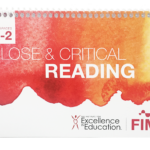Research-Based effective literacy instruction for the Additional Instructional Time Grant
FIM Early Literacy is an approved intervention by MDE for the 2019-2020 Research-based Effective Literacy Instruction Grants.
What is the FIM?
The Focused Instructional Model (FIM) is a research-based instructional method developed by the Institute for Excellence in Education (IEE). FIM transforms classroom instruction and drives increased student achievement. This systematic process provides an opportunity for teachers to scaffold student learning and encourages the growth of literacy skills from an early age. Teachers use the process to monitor their students’ mastery of foundational skills in reading, writing, and listening and use the incoming data to provide interventions as appropriate. It is an integrative, holistic approach to teaching built upon instructional best practices.
FIM Early Literacy focuses around: 1) Common Core State Standards (CCSS) reading and writing foundational skills, 2) Close and critical reading skills, 3) speaking and listening skills, and 4) responding to text dependent questions. The goal of FIM Early Literacy is to bridge the gap of reading deficiencies so students are on track and on target for reading proficiency by 3rd grade. This is accomplished through repetitive exposure to grade level content while providing the teacher with formative data to support in-class intervention.
How does this work in my classroom?
Facilitated by trained coaches, FIM implementation occurs in two phases: 1) an in-depth professional development workshop and 2) ongoing coaching and support to assist individual teachers with FIM operation in the classroom.
Throughout a typical week, students are exposed to reading and writing foundational skills in a systematic manner. Students’ mastery of the content is monitored on a regular basis and intervention is provided when appropriate. In addition, close and critical reading skills are being developed at an early age through intentional scaffolding of instruction along with targeted support during a weekly shared reading routine around grade level informational text and exposure to text-dependent questions.
FIM Early Literacy develops skills in the areas of phonemic awareness, phonics, vocabulary, fluency, and comprehension skills. It includes regular assessments so teachers can examine the incoming data and differentiate as necessary.
Where is the research?
FIM Early Literacy is backed by research-based best practices. Below is a list of some of the research behind the development of FIM:
- Douglas Reeves and Larry Ainsworth - Power Standards: Identifying the Standards that Matter Most (2004). These two are the originators of the educational term "Power Standards" and they provide research on how focusing on key concepts benefits students.
- Mike Schmoker - Focus: Elevating the Essentials to Radically Improve Student Learning (2011). Provides the idea of paring down your direct instruction to focus on highly important grade-level content.
- Paul Black and Dylan Wiliam - Inside the Black Box: Raising Standards through Classroom Assessment (1998). This quick read provides the research behind how using daily formative assessment can help teachers make quality instructional decisions.
- Hermann Ebbinghaus (1885) - We use his research on "Spacing Effect" (referring back to previously learned concepts) and the "Forgetting Curve" (if concepts aren't revisited, they flee the brain).
IEE has a history of providing high quality professional development and literacy coaching. FIM Early Literacy aligns nicely with the MDE Essential Instructional Practices and it includes targeted evaluation plans to ensure the system is being carried out with fidelity.
FIM Early Literacy contact
Interested? Please fill out this form and we will get in touch with you shortly.









